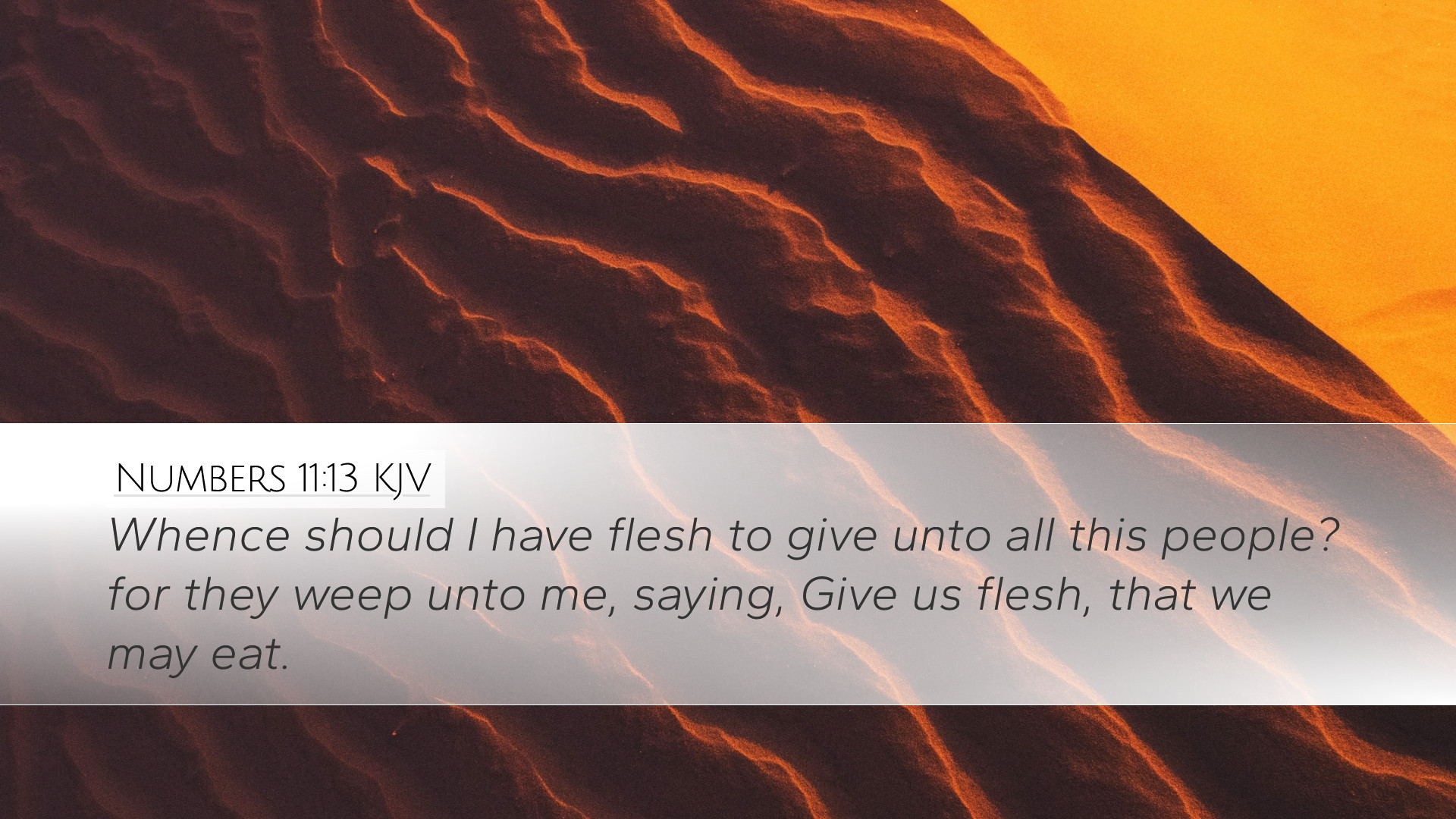Commentary on Numbers 11:13
Numbers 11:13 reads: "Whence should I have flesh to give unto all this people? for they weep unto me, saying, Give us flesh, that we may eat." This verse reveals the struggles of Moses as he leads the Israelites through the wilderness. The burden of leadership weighs heavily on him, and his complaint reflects the deep challenges faced by those charged with guiding a community.
General Context and Overview
The context of Numbers 11 is crucial in understanding Moses’ plight. The Israelites, weary from their diet of manna and longing for the fleshpots of Egypt, manifest their dissatisfaction. Their cry for meat is a reflection not only of physical hunger but also of a deeper spiritual malaise. In the previous chapters, they encountered challenges that tested their faith, leading to complaints about God's provision.
Moses' Leadership Burden
In this passage, Moses' lament illustrates a leader's frustration and vulnerability. Several commentators provide insights on this matter:
- Matthew Henry emphasizes that Moses feels isolated in his role. He expresses the enormity of the responsibility placed upon him, questioning how he can meet the demands of such a large group of people. His anguish reflects the human limitations of even the greatest leaders.
- Albert Barnes points out the absurdity of Israel's expectations. Despite God's miraculous provision, the Israelites focus on what they lack rather than what has been provided. Moses’ plea reveals his struggle to reconcile his own limitations with the expectations of the people.
- Adam Clarke interprets this moment as a profound insight into Moses' character. He asserts that Moses understands his limitations and acknowledges the extent of his responsibilities, which weighs heavily on him, showcasing both humility and desperation.
Spiritual Lessons
From Moses' cry in Numbers 11:13, several spiritual lessons emerge that can benefit pastors, theologians, and students alike:
- The Burden of Leadership: Leadership in spiritual matters involves significant emotional and spiritual labor. Leaders must navigate the complexities of their congregants' desires while remaining faithful to God's calling.
- The Danger of Grumbling: The Israelites' demand for meat originates from a place of complaint rather than gratitude. This verse serves as a reminder to maintain a posture of thankfulness, even amidst trials.
- Human Limitations: Moses’ response affirms that no leader can meet every need or expectation. This acknowledgment is essential for effective ministry to develop in reliance on God.
God's Provision and Challenging Moments
Despite Moses’ doubts, the passage underscores God's faithfulness in times of crisis. God responds to Moses’ complaint by promising meat for the people, leading to a significant lesson regarding divine provision:
- Divine Response: God's assurance to Moses highlights that He remains attentive to the needs of His people, even when complaints arise. This can encourage leaders to trust in God's providence amid adversity.
- Relying on God: The leader's reliance must be placed in God rather than their own strength or resources. Moses’ question reflects human frailty, but God's affirmation showcases divine power.
- Faith in Action: The contrast between Moses’ limitation and God's ability serves as a model for faith in action. Leaders are called to exercise faith even when circumstances seem daunting.
Application for Today's Leaders
In contemporary ministry, the lessons from Numbers 11:13 remain timeless and applicable:
- Empathy and Understanding: Pastors should cultivate empathy towards their congregation's frustrations, recognizing that spiritual journeys often involve periods of yearning and dissatisfaction.
- Encouraging Gratitude: Ministries must work to instill a culture of thanksgiving, teaching congregants to focus on God's ongoing provision instead of their perceived lacks.
- Developing Trust in God: Leaders should encourage reliance on God’s strength, fostering an environment where faith can grow despite challenges.
Conclusion
Numbers 11:13 serves as a poignant reminder of the complexities of leadership and the continual need for spiritual dependence on God. The collective insights from esteemed commentaries illuminate Moses' struggle and the overarching themes of dependence, provision, and leadership. Understanding these facets equips today’s spiritual leaders to navigate their paths with grace and courage.


